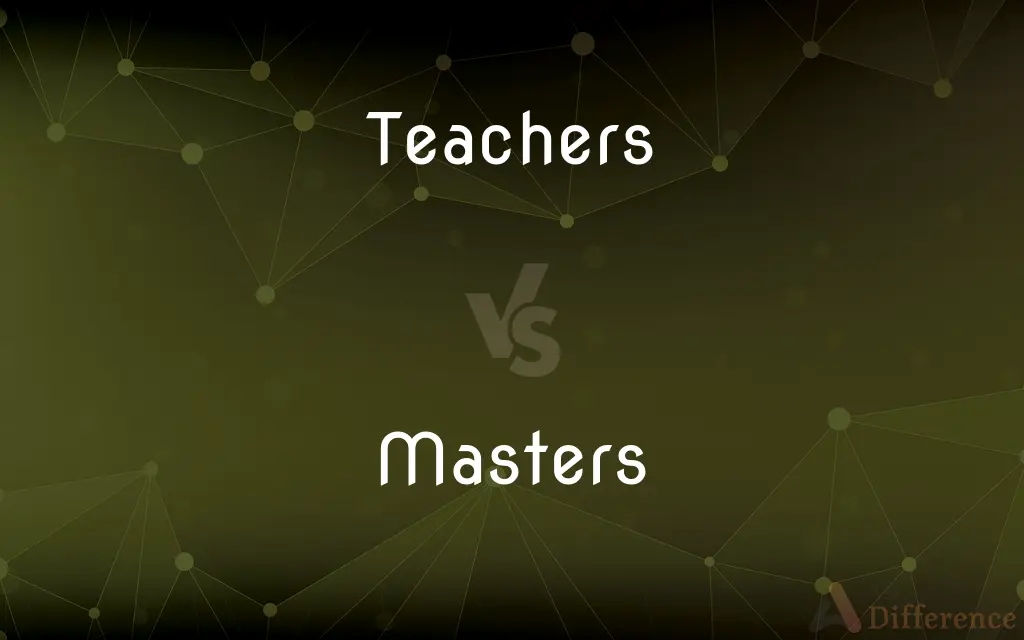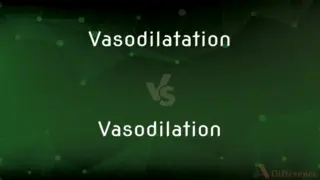Teachers vs. Masters — What's the Difference?
By Fiza Rafique & Urooj Arif — Updated on May 14, 2024
Teachers instruct and guide students in educational settings, focusing on knowledge and skills across various subjects, while masters are experts in their fields, often mentoring with a focus on mastery and depth in specific disciplines.

Difference Between Teachers and Masters
Table of Contents
ADVERTISEMENT
Key Differences
Teachers are primarily found in educational institutions where they deliver structured curriculum content to students of various ages, aiming to impart a broad range of knowledge and skills. Conversely, masters are typically recognized experts or artisans in particular fields who may teach or mentor, emphasizing depth and expertise.
The role of a teacher often involves developing lesson plans, assessing student performance, and adapting teaching methods to meet educational standards and students' needs. On the other hand, a master focuses on the transfer of specialized skills or deep knowledge, often through apprenticeships or dedicated mentoring.
Teachers are required to have specific educational qualifications and certifications appropriate to their level of teaching, which ensures they meet pedagogical standards. In contrast, masters are often distinguished by their achievements, experience, and recognition within their specific field rather than formal academic credentials.
While teachers interact with a broader student base across a variety of subjects, masters typically engage with fewer students or apprentices, fostering a close, intensive learning experience focused on advanced skills and practices.
The influence of a teacher is crucial in the foundational educational phases of a person's life, helping to shape their basic understanding and skills across many areas. Conversely, the influence of a master is most significant in the advanced stages of skill development, where specialized expertise and mastery are the goals.
ADVERTISEMENT
Comparison Chart
Focus
Broad educational curriculum
Specialized skill or knowledge mastery
Setting
Schools, colleges
Workshops, studios, on-the-job training
Student Interaction
Diverse student groups, larger classes
Smaller groups, often one-on-one mentoring
Qualifications
Educational degrees, teaching certifications
Experience, achievements in the field
Outcome
General knowledge and skills development
Expertise and high proficiency in a discipline
Compare with Definitions
Teachers
Assists in learning through effective teaching methods.
As a facilitator, the teacher used group activities to enhance learning.
Masters
A person with extensive knowledge or ability in a subject.
The master sculptor showcased his skill at the workshop.
Teachers
Someone who provides education and guidance.
The teacher explained the laws of physics to the class.
Masters
A teacher or guide in spiritual or philosophical contexts.
The spiritual master guided his followers through meditation.
Teachers
Helps students navigate learning paths.
The teacher guided the students through their science project.
Masters
Highly skilled in a specific field.
As a master carpenter, he created intricate woodwork designs.
Teachers
Offers support beyond traditional teaching roles.
The teacher mentored her students in their career choices.
Masters
Skilled in a particular craft or trade.
The master tailor took precise measurements for the custom suit.
Teachers
Delivers instructional content in a classroom.
The instructor covered three chapters during today's class.
Masters
Provides guidance and knowledge in a focused discipline.
The master in martial arts trained her disciples intensively.
Teachers
One who teaches, especially one hired to teach.
Masters
Plural of master
Teachers
Plural of teacher
Masters
A master's degree.
Masters
United States poet (1869-1950)
Common Curiosities
How does one become recognized as a master in a field?
Achieving mastery usually involves years of practice, significant achievements, and recognition by peers in the field.
What qualifications are needed to become a teacher?
Teachers typically need a degree in education or a specific subject area, along with teaching certification.
What is the difference between a teacher and a professor?
A professor is a higher education teacher, often involved in research, teaching at a university level.
What impact do masters have on their field?
Masters often drive innovation and maintain high standards within their disciplines.
Why is mentorship important in mastering a skill?
Mentorship provides personalized guidance and advanced insights, crucial for achieving proficiency and expertise.
Can a master be self-taught?
Yes, many masters have achieved their status through self-directed learning and extensive practice.
How do the goals of teachers and masters differ in their teaching?
Teachers aim to impart a broad set of skills and knowledge, while masters focus on cultivating advanced skills and deep understanding in specific areas.
Can teachers also be masters?
Yes, teachers can also be masters if they possess high-level expertise and experience in a particular subject.
How do teaching methods differ between teachers and masters?
Teachers often use a standardized curriculum and instructional methods, while masters may use more personalized, hands-on techniques.
What are some challenges teachers face in today's educational environment?
Teachers face challenges such as adapting to diverse learning needs, integrating technology, and managing larger class sizes.
Share Your Discovery

Previous Comparison
Larboard vs. Port
Next Comparison
Vasodilatation vs. VasodilationAuthor Spotlight
Written by
Fiza RafiqueFiza Rafique is a skilled content writer at AskDifference.com, where she meticulously refines and enhances written pieces. Drawing from her vast editorial expertise, Fiza ensures clarity, accuracy, and precision in every article. Passionate about language, she continually seeks to elevate the quality of content for readers worldwide.
Co-written by
Urooj ArifUrooj is a skilled content writer at Ask Difference, known for her exceptional ability to simplify complex topics into engaging and informative content. With a passion for research and a flair for clear, concise writing, she consistently delivers articles that resonate with our diverse audience.












































